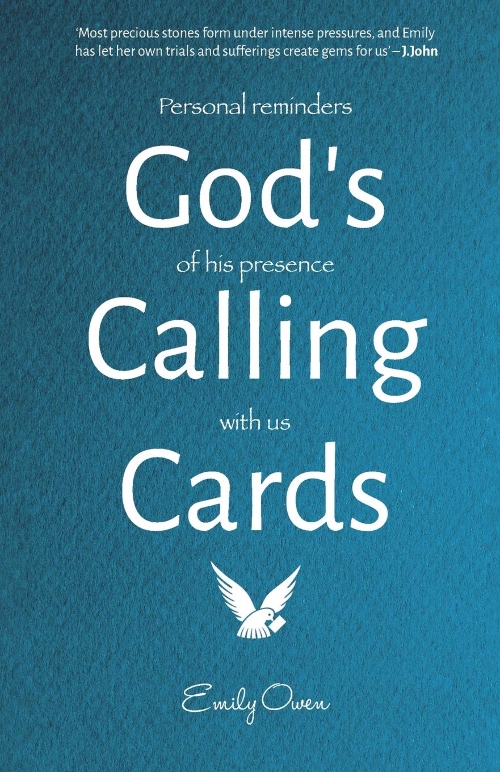God's Calling Cards by Emily Owen
Emily Owen explores the idea that God has always been leaving personalised calling cards to his followers to remind them of his presence, and the result is a rewarding, meditative read, free of sentimentality
 God's Calling Cards: Personal reminders of His presence with us
God's Calling Cards: Personal reminders of His presence with us
By Emily Owen
Authentic
ISBN: 978-1788930253
Reviewed by Terry Young
This book is more an experience than a read, with dreamy sequences of Scripture, scattered prose that verges on poetry, commentary and imagined conversations wandering across the page before they sit down beside you to see if you are free for a spot of contemplation.
I’m not sure how best to approach Emily’s monograph: I sat down (or rather, lounged on the couch) and took it in over two sessions, split by a short break while the detachable screen of my laptop recharged. I think each of the dozen chapters are intended for a single sitting and, averaging under 20 pages of sparse copy, each would be an easy read. The reflections at the end are also intended to slow you down, so this may be a viable strategy. However, it took me much longer than a single chapter (or even three or four chapters) to start to get a feel for what I was reading and to decide that I rather liked it.
By the end, I was hooked by the gentle repetitions, the lapping waves of each new theme washing over the last and then ebbing away to reveal the remains of something you read earlier and also leaving you a little calmer and a touch more thoughtful. Personally, I’d recommend spending an afternoon with it, especially if you think you are too busy to find the time.
At first sight, it is a series of meditations, each with a ‘calling card,’ or single-themed message, which infuses each chapter and appears as an icon at the end of each Bible character’s reflection: Eve, Hagar (hooray for Hagar!), Abraham, and so forth. The chronological mix gets tangled towards the end when God becomes the speaker (through Jeremiah) but the idea is pretty straightforward. Thus, the message through Eve is to come out of hiding, and belong, while Ananias’s calling card is trust (note, he’s not Sapphira’s mate of the same name who tried to take trust off in a completely different direction). Fans of The Polar Express will recognise a similar approach to ticketing.
It’s also a bit of a whodunit because Emily doesn’t really explain who she is or what has happened to her. She gives us the bald facts near the start – that she is deaf but could hear once – and then drops in elements of explanation in the form of flashbulb moments that illuminate a hospital scene here or a discussion there. The narrative we can construct is both compellingly honest and horrific, but it provides the essential backdrop to these reflections.
So, who should read this book? As I’ve indicated, I think this is a book for busy people because it will reward so richly the painful and pricey process of creating the time to read it. I’d also recommend it to those who dislike touchy-feely books because although it is saturated in sentiment, it is gloriously free of sentimentality, and all those other synthetic emotional E-numbers that get stirred into a lot of Christian recipes.
There is a group of Christians who should steer clear of this little number. If you have a faith that demands physical healing for all God’s children, or if you see physical infirmity as God’s plan B for anyone, this will only complicate your theology – so best give it a miss. Best not read Genesis 32, or 2 Corinthians 4, 5 and 12, either. If, on the other hand, you are open to a more balanced theology, this is a way to explore the other side of the healing coin in a spirit of love, joy, peace and all those other good things Paul wrote to his Galatian friends about.
Never having heard of Emily before, I came a little wary of saccharine but found honey; I expected mild admonition but found goodwill and the offer of a shared experience. Will it work for you? I have no idea, but I don’t think you’ll be disappointed if you give it a try.
Professor Terry Young is an author and member of a Baptist church. He set up Datchet Consulting which combines his experience in industry and academia
Baptist Times, 22/10/2021